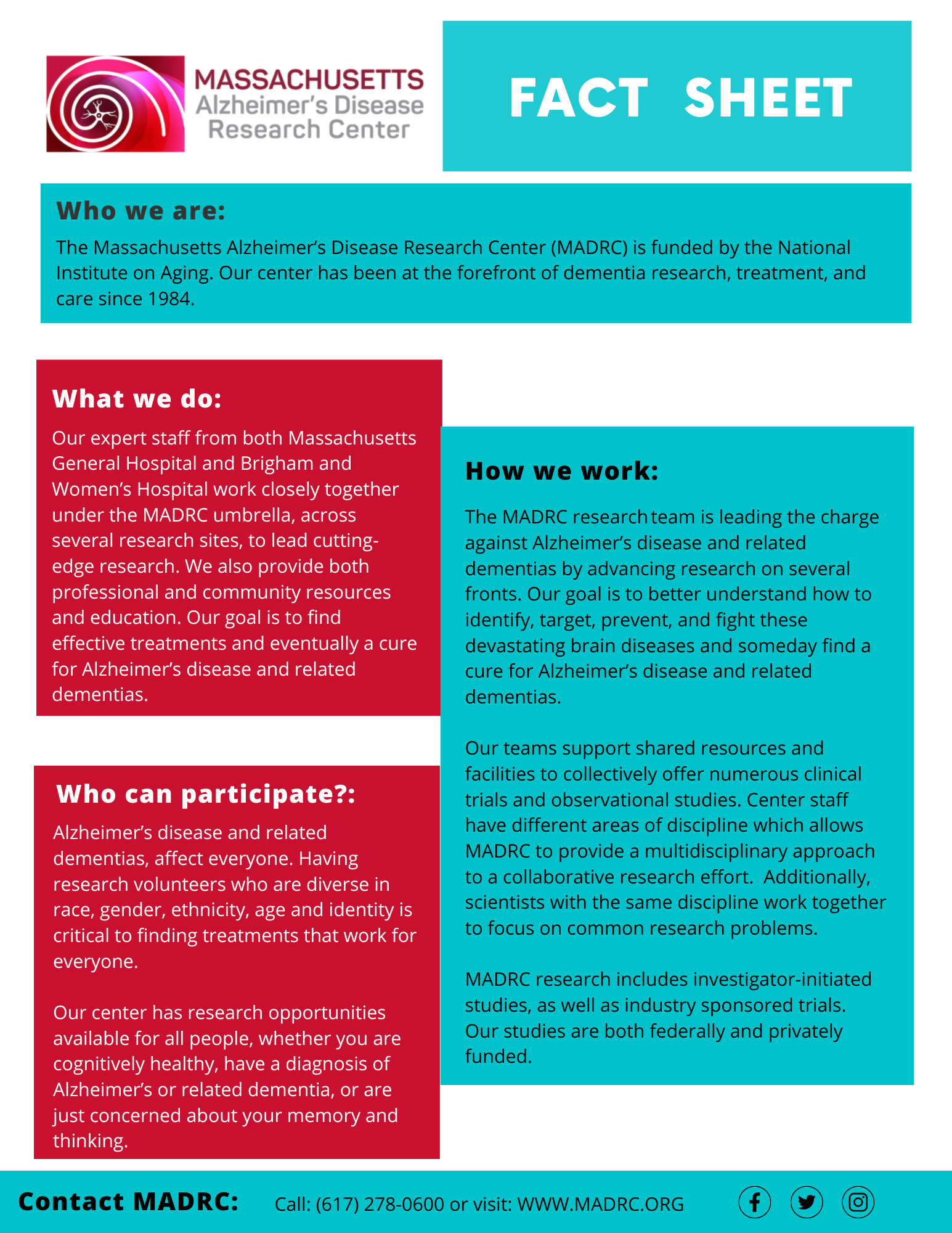Diagnosis
Click graphic above to enlarge. For Spanish version click here.
Concerned about your memory?
If you have concerns about your memory and thinking, you can schedule an evaluation with a specialist at one of our centers.
Mass General Brigham (MGB) Memory Care
MGB memory care centers have specialists in behavioral neurology, neuropsychiatry, geriatric psychiatry, neuropsychology and social work. These teams can address the cognitive, emotional and behavioral components of Alzheimer’s disease and related dementia during each stage of the illness.
Brigham & Women’s Hospital
Center for Brain Mind Medicine
(617) 732-8060
Massachusetts General Hospital
Memory Disorders Division
(617) 726-1728
You can also schedule an appointment with your primary care physician (PCP). Your PCP may be able to provide you with testing and a diagnosis themselves or may refer you to a doctor who specializes in memory and cognition.
Assessment Specialists:
Geriatrician: A specialist physician (MD) who specializes in conditions unique to older adults.
Geriatric Psychiatrist: A specialist physician (MD) who specializes in psychiatric conditions and psychology among older adults. They help detect and treat mood and behavior symptoms associated with dementia, such as depression or anxiety.
Neurologist: A specialist (MD) in diseases of the brain and nervous system. A behavioral or cognitive neurologist further specializes in the diagnosis and treatment of conditions like Alzheimer’s disease.
Neuropsychologist: A psychologist (PhD or PsyD) with specialized training in how to assess the function of the brain with standardized tests. Typically, a referral from your doctor is needed to meet with this type of expert.
How is memory evaluated?
In order to assess how well your brain is functioning, your memory evaluation may include the following:
- A review of personal and family medical history
- A general physical exam
- A neurological exam, including tests of reflexes, coordination, eye movement, speech, sensation, muscle strength and tone, walking and balance
- A Neuropsychological exam: These tests evaluate cognitive ability. They consist of interviews, paper and pencil testing and sometimes computerized tests. These tests can be frustrating, but they help specialists better understand how your brain is functioning.
- Questionnaires about your mood, behavior and daily functioning are typically asked of both the patient and someone who knows them very well.
- A brain scan (CT, MRI or PET)
- CT – Computed tomography: This scan provides images of the structure of the brain tissue and show its shape and volume
- MRI – Magnetic resonance imaging: This scan provides images of the structure of the brain tissue and show its shape and volume
- PET – Positron emission tomography – This scan uses a contrast to either provide a functional image of the cell activity in the brain or an image of the pathological changes seen in Alzheimer’s disease, such as amyloid plaques (a protein that is deposited in the brains of patients with Alzheimer’s disease).
For a detailed explanation of how to get a diagnosis, see our Road Map to Dementia Diagnosis. Click here for Spanish Road Map to Dementia Diagnosis
Click graphic to enlarge. For Spanish version click here.
To learn about the many different types of dementia diagnosis,
view our Fact Sheets.



